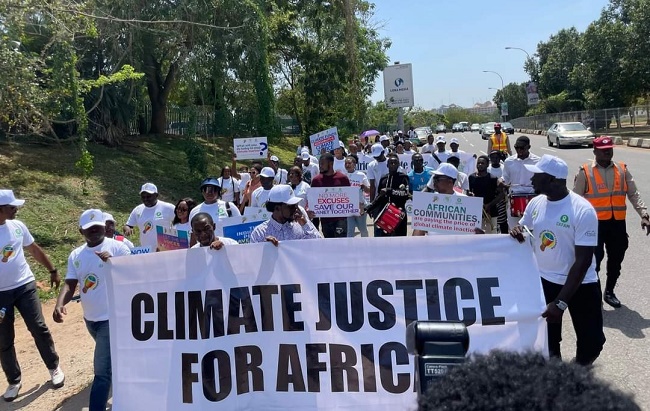Today (May 2, 2025), in Arusha, Tanzania, just below the ridgeline of Mount Meru and not far from the Kenyan border, Africa will do something it has never done before.

Civil society leaders from across the continent will walk into the African Court on Human and Peoples’ Rights and formally ask: What are African governments legally obligated to do when the climate crisis threatens food, water, health, and life itself?
This is not a lawsuit. It’s a petition for an advisory opinion, a legal interpretation of how long-standing human rights obligations should apply in the era of climate breakdown. It won’t assign guilt or impose penalties. But it could shape the future of how rights are understood, enforced, and defended across the continent.
And for the first time, this question won’t come from Geneva or The Hague. It will come from Africa itself.
Africa contributes less than 4% of global emissions. And yet, it is absorbing some of the heaviest impacts.
More than 61 million people in Southern Africa are facing food insecurity following the region’s worst drought in over a century. In Ghana and Côte d’Ivoire, cocoa farmers are losing entire harvests to floods, heat, and fungal disease, threatening over a million livelihoods. In Kenya, 2.6 million livestock have died from prolonged drought, unraveling traditional pastoralist economies. In Chad, over 1.5 million people have been displaced by floods. And in Morocco, the Al Massira Dam has dropped below 6% capacity, prompting widespread job loss and public protest over water scarcity.
Yet despite the scale of the crisis, few climate-related cases have reached the courts across all 54 African nations. According to the Sabin Center’s Global Climate Change Litigation Database, only 19 cases have been filed across five jurisdictions. Together, these cases make up just 9% of climate litigation from the Global South and less than 1% of the global total. The problem isn’t a lack of harm, it’s a lack of legal clarity, institutional support, and investment in the systems that would allow climate justice to be pursued through the courts.
The law, for too long, has remained quiet. This petition seeks to change that.
An advisory opinion won’t create new law. But it will clarify what existing laws mean in a climate-compromised world. It would give judges, lawmakers, and advocates across Africa a shared framework for holding states accountable, not just politically, but legally.
This petition didn’t come from a single institution. It was built over four years of regional organising by the African Climate Platform (ACP), a coalition of over 50 organisations, including public interest lawyers, grassroots leaders, Indigenous communities, youth, and climate defenders.
Together, they developed case studies from across all five African regions, documenting how climate change is already infringing on human rights, from food insecurity in Southern Africa to water shortages in North Africa to displacement in Central Africa. They drew on regional legal instruments like the African Charter, the Maputo Protocol, and the Kampala Convention. And they drafted a legal question with far-reaching consequences: what do states owe their people when climate threats are no longer hypothetical?
That question will be submitted to the African Court in Arusha on May 2.
If the Court agrees to take up the petition and delivers a strong, rights-affirming opinion, it would be a historic turning point. Judges across Africa could cite it. Legislatures could draft from it. Civil society could use it to build strategic litigation that pushes beyond slogans into enforceable rights.
Even if the ruling is narrow, the act of filing the petition is precedent-setting. It’s about whether African citizens, already living through the worst of climate collapse, can rely on their legal systems to respond.
Africa has often been described as the canary in the coal mine. But that metaphor is no longer useful.
Africa is not the warning. Africa is the frontline. And with this petition, it is becoming the legal voice.
On May 2, a continent will ask its own court to define what justice looks like, not just in the language of climate targets and finance pledges, but in the real, everyday rights of people trying to live with heat, hunger, and uncertainty.
This question has waited too long to be asked. Now it’s heading to court.
By Konah Brownell, Research & Policy Fellow at the Massachusetts Competitive Partnership
